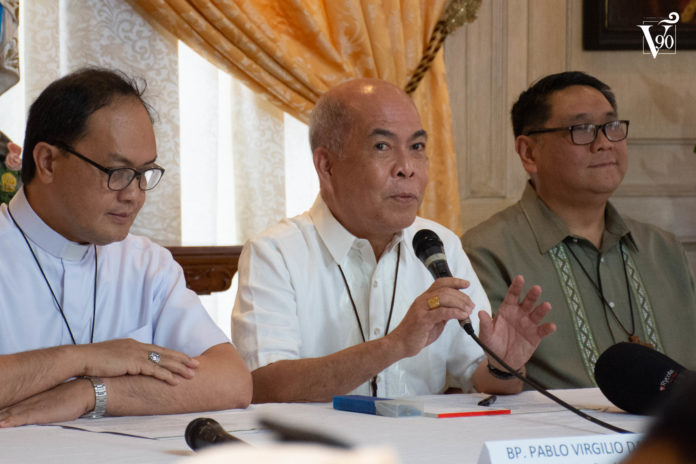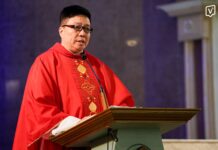
CRISIS threatens to engulf the Catholic Church after revelations of more cases of sexual abuse committed on minors by clergymen and cover-ups by the hierarchy in dioceses in New York and Pennsylvania in the United States and in Australia.
In the wake of these scandals, members of the clergy in the Philippines admited that guidelines on the protection of minors set by the Catholic Bishops’ Conference of the Philippines (CBCP) are lacking and that better pastoral response has to be rolled out.
Fr. Winniefred Naboya, the judicial vicar of the Diocese of Malolos in Bulacan, said the Church has been slow in responding to cases of clerical abuse and admitted that spiritual approach is not enough.
“The serious attack to the Church now is the apparent condoning of the abuses made by clerics,” Naboya told the Varsitarian in an interview.
“For at times being silent and naïve and slow to act amidst reports of abuses. In my opinion, this can be partly true in the sense that the Church has its own way of dealing with the problem. Spiritual and not legal was most of the time the solution or opting for the “removal and transfer” of assignments to soften or condone the issue.”
Naboya admitted that in the past, the “routine procedure as solutions to the problem” was by ignoring the issue or just by reassigning priest-abusers to different dioceses.
He said, however, that the Church has now become “more rigid in disciplining her clergy,” citing Pope St. John Paul II’s motu proprio “Sacramentorum Sanctitatis Tutela,” which stated that such crimes must be reported to civil authorities to make way for an investigation according to the laws of the state.
In a pastoral letter on Aug. 30, CBCP President and Davao Archbishop Romulo Valles called on canon lawyers and bishops to revisit the existing guidelines “with renewed resolve and commitment to implement them and not cover them up.”
“The present painful situation is a good occasion for us bishops to revisit and review the existing guidelines that we have for the protection of minors and vulnerable adults, and with renewed resolve and commitment to implement them and not cover them up,” his statement read.
In 2010, Pope Emeritus Benedict XVI added sexual crimes committed by priests against minors under graviora delicta or the “more grave crimes” in the canonical procedure.
Naboya explained that cases of abuse on minors are irremediable and penalized by dismissal from the priesthood, citing Canon 1095.
In July of 2017, Msgr. Arnel Lagarejos, parish priest of St. John the Baptist Parish in Taytay, Rizal, was arrested for human trafficking after he was caught with a 13-year-old girl on the way to a motel in Marikina in an entrapment operation.
Antipolo Bishop Francisco de Leon relieved Lagarejos of his duties in the diocese and banned any form of communication other than to his counsel and brother-priests.
“Even as his guilt remains to be proven and the precepts of the Constitution grant him the presumption of innocence, the Diocese has taken every step to hold him answerable for the charges brought against him both before the Republic and before the Church,” the diocese’s statement read.
Cases involving victims who are 13 years old and below are considered “pedophilia,” “grave” and a “serious offense” under canon law.
Based on the CBCP’s guidelines, cases of clerical abuse are first discussed in an internal forum between the superior priest, the accused priest and the victim.
The case will elevated to an external forum where proper investigations will begin if the case is not resolved within the internal forum.
These cases are then sent to the Congregation on the Doctrine of Faith at the Vatican. The bishop waits for their decision on the penalties to be given to the accused priest.
The CBCP’s exhortation on the Pastoral Care and Protection of Minors, issued in 2016, states that “bishops will not pre-empt investigations by declaring innocence or pronouncing exoneration until after a thorough, impartial and credible evaluation of facts as established by competent evidence.”
It added that bishops must not allow the cleric involved in child abuse cases to leave the diocese, ensuring his availability during the investiation.
UST Faculty of Canon Law Dean Fr. Isaias Tiongco, O.P. said bishops should collaborate with civil authorities and not keep the case within the ecclesiastical forum alone.
Novaliches Bishop Antonio Tobias, a member of the CBCP’s National Tribunal of Appeals, stressed that there is a parallel justice system between the Church and the state.
“Kapag nagsabi ang biktima sa state, right niya ‘yon, at kapag tinanggap din ng estado ang kaso, dalawa na ngayon ang naghuhusga sa kasong maaaring iba ang desisyon ng simbahan at iba rin ang desisyon ng estado,” he told the Varsitarian.
The appeals tribunal, officially named as the National Appellate Matrimonial Tribunal, is a 14-man team led by retired Archbishop Emeritus Oscar Cruz that probes sexual abuse against minors and annulment cases of Catholic marriages.
Clericalism, formation and rehabilitation
Tobias said one root of these abuses is “clericalism” or the mentality that the priest is a king.
“Clericalism, ‘yan ang dahilan kung bakit dapat maging mapagkumbaba ang mga pari, kasama ang mga obispo at relihiyoso,” he told the Varsitarian.
He said the CBCP should tackle the said issue in its next plenary session and added that cover-ups or reassigning priest-abusers to other dioceses should stop.
“‘Kapag mayroong ganiyan, hindi na dapat i-cover up. Kapag lumabas na sa external forum, wala nang magagawa. Hindi na puwede ang ginagawa noon. Nire-rehab na ngayon [at] inilalagay na malayo sa tao dahil [lumalabas] na risk danger na siya, parang hayop na nakawala na kahit sino kakagatin. ‘Yon ang mga ginagawa ng Simbahan ngayon: Wala kang parokya, nasa bahay ka lang ng obispo at nakatago ka lang dahil ikaw ay asong ulol [or] danger,” he said.
The prelate took a swipe at the media for allegedly wanting to humiliate the Catholic Church by looking only at the cases of sexual abuse in it and not toward other religions as well.
“Sa media, huwag niyo lang tingnan ang Katoliko dahil mayroon ding nangyayaring ganiyan sa ibang relihiyon. Kung hindi talaga mag-iingat, lalala ito kasi alam mo naman ang media gusto niyang ipahiya ang Simbahang Katolika. Maraming ganiyan na gustong ipahiya ang Simbahan dahil sa issue na ‘yan katulad ngayon sa nangyayari sa America, Canada at Australia,” he said.
He said, however, that the recent developments were only a challenge for the Church and its faithful.
“Parang ito ay pagsubok lang ng Simbahan na kailangan lang pagdaanan. Lalo pang lalakas ‘yan pagkatapos. Hindi natin maso-solve lahat pero kapag napag-uusapan ang mga kahinaan mas nagiging magaan sa atin,” Tobias added.
For Naboya, seminaries should be strict in accepting candidates to the priesthood, particularly those with “distorted sexual orientation or preference.”
“Those men with distorted sexual orientation or sexual preference, if not given due guidance, should not be accepted or even expelled in seminary formation,” he said.
Priests should also be “extra faithful” to live up their vows of celibacy and chastity, and stiffer penalties should be given to those who will be found guilty, whether in the canonical or legal procedures.
He added that both the abuser and the abused need psychological healing, and traced the cause of varying factors that lead priests to commit these abuses to family upbringing, community setting, media, friends and school.
The Catholic Church in the country offers renewal programs and spiritual retreats such as the John Mary Vianney Galilee Development and Retreat Center in Tagaytay that can accommodate around 45 priests, which also serves as a place for those who were defrocked due to sexual misconduct.
The center highlights its goal to “rehabilitation” by offering therapeutic and proactive programs.
The first aims to help priests who committed abuse while the latter focuses on the prevention. Their “rehabilitation” services cost around P80,000 per priest, which includes his board and lodging to which his stay can last three to six months depending on the gravity of their violation.
The CBCP also had a short-lived program called “Assist Ministry” that aided priests who were convicted.
In 2002, the country’s bishops issued an apology for cases of clerical abuse titled “Hope in the Midst of Crisis,” where it admitted that over 200 out of 7,000 priests in the country had committed abuse or misconduct over the past 20 years. The priests were not named.
The release of the CBCP’s pastoral guidelines on sexual abuse or misconduct followed in 2003, a protocol to be used in addressing the said issue among members of the clergy.
In August of this year, a grand jury report in Philadelphia in the United States exposed more than 300 clergymen which were reported to have abused 1,000 children, which led to the resignation of Washington Archbishop Donald Wuerl.
Thirty-four active and retired Chilean bishops have also offered their resignation following decades of cover-up on sexual abuse and destroying records.
In June 2018, Vatican ex-diplomat Msgr. Carlo Capella was sentenced five years in prison after being convicted for child pornography offenses.
After being found guilty of concealing a sexual abuse by a priest, Australian Archbishop Philip Wilson also resigned in July of this year.
Combating clergy abuses
What role should the lay people play in this crisis within the Church?
Msgr. Manuel Gabriel, executive secretary of the CBCP Committee on Basic Ecclesial Communities, said the laity must combat the clergy’s “varifold abuses” whenever they happen.
“The laity is what it takes to face the crisis head-on. They will have to combat the clergy’s varifold abuses wherever and however they occur. They have to inspire their pastors to be servant leaders of the Gospel. The laity’s mission-driven life of faith will have to transform a new way of being Church, living communities of faith,” he said in an email to the Varsitarian.
Gabriel said the leadership of the Church in the country should evaluate how it is dealing with moral issues and crises.
“The Philippine Church [leaders] have to brace themselves for any eventuality in the near future. While the lay faithful might choose to deny that these scandals are not of alarming proportions in our midst, however, there is a need to evaluate the local hierarchy’s mode and orientation in managing moral issues and crises involving the clergy,” he said.
He admitted that many Catholics have “jumped out of the fold” after being “scandalized and betrayed by their shepherds.”
“They feel that the bishops’ staff failed to defend the young ewes from the attack of wolves in clerical garbs. Who protects them now when the ones who wield power are simply absolved when they abuse it? What happens to the fold when the very shepherds show no genuine accountability for the security and safety of their own flock?” he said.













